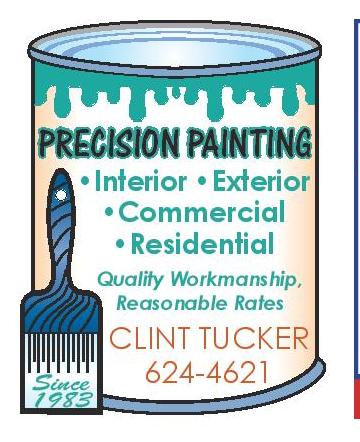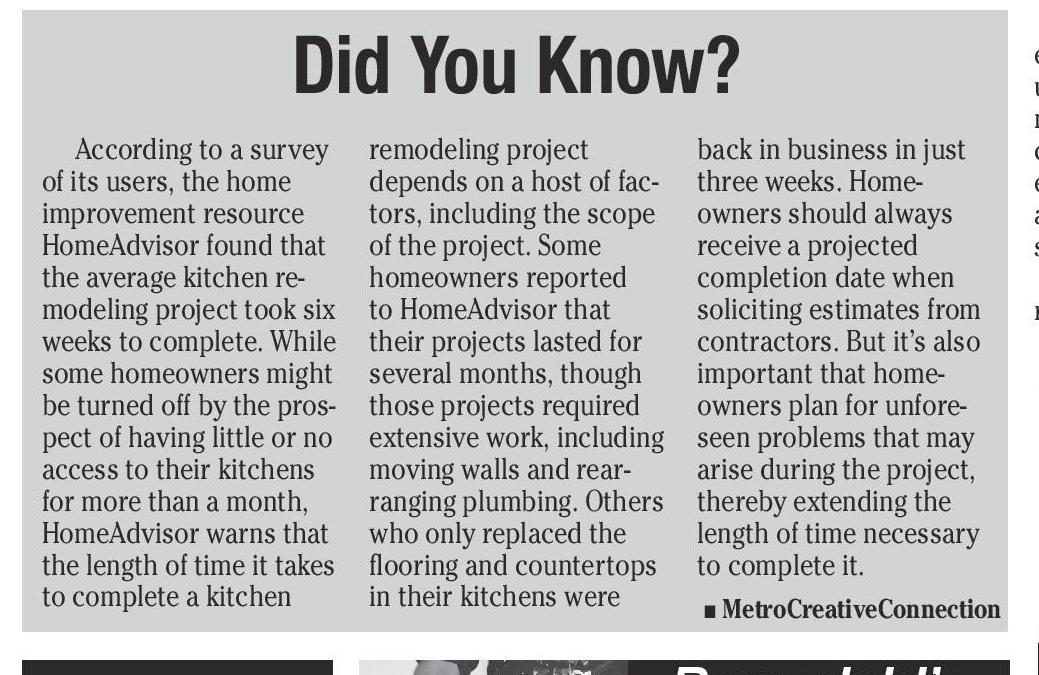092617_YKBP_A13.pdf








Broadcaster Press 13
September 26, 2017 www.broadcasteronline.com
F
all Home
Improvement
& Car Care
How To Care For Tools Properly Create More Closet Space
Without Major Renovations
Homeowners often
choose to save money and
learn valuable skills by
doing their own home improvement projects. These
minor or major renovations are made much more
successful by having the
right tools for the job.
Investing in good tools can
be smart, but those tools
are only effective if they
are accessible and in good
repair. Homeowners who
emphasize taking care of
their tools can make DIY
projects that much easier
and more rewarding.
Establish a place for
everything
Nothing can be more
frustrating than wanting
to begin a project only to
spend precious time looking for tools. Almost as important as the investment
in tools is the investment
in tool storage. Hardwood
or metal tool chests feature various drawers and
cabinets that can house
tools of different sizes. By
keeping tools in a chest,
they’re easy to find and
more likely to stay sharp
and in good condition.
Metal tools should be
stored in a cool, dry area,
as dust and moisture can
cause rusting issues on
metal tools. One way to
alleviate rust is to spray
metal tools with a product
like WD-40 to serve as
a moisture barrier, then
store them in closed drawers or containers.
All tools do not necessarily have to be stored in a
garage or work shed. Many
homeowners like to keep
smaller tools in the house
so that frequently used
items are within reach. A
hammer, wrench, pliers,
and a few screwdrivers
are handy tools to have
around inside the house.
Put tools back
Remember to return
tools to their proper storage spots when you finish
using them so they can be
easily found the next time
they’re needed. This saves
time and even increases
personal safety. Tools that
are left around can become
tripping hazards or end up
in the hands of children.
Hang garden tools
Whether garden tools
are kept in a shed or inside
the home, hang them
so they don’t crowd the
floor. Moisture can creep
up from concrete or dirt
floors and eventually compromise the tools. Keep
cords neatly wound and
secured as well.
Rely on original cases
Power tools typically
are packaged in hard plastic cases. This keeps the
tools secure and often is
the best method of storage. Original cases also
help protect tools from humidity. Label each case so
tools are easily identifiable
when stacked on a shelf or
in a cabinet.
Clean tools after use
Hand tools and gardening tools usually can be
cleaned with rags. If these
tools are especially dirty,
give them a wash with
soap and water. Just be
sure to dry the tools thoroughly after washing them.
LifeHacker advises wiping
down wooden handles on
tools with linseed oil to
keep them in good repair.
Power tools may benefit
from compressed air being
blown into smaller crevices to dislodge sawdust
and other debris. Lubricate any moving parts with
a product recommended
by the manufacturer.
Keeping tools clean and
in good repair goes a long
way toward safer, more efficient home improvement
projects.
? MetroCreativeConnection
Did You Know?
According to a survey
of its users, the home
improvement resource
HomeAdvisor found that
the average kitchen remodeling project took six
weeks to complete. While
some homeowners might
be turned off by the prospect of having little or no
access to their kitchens
for more than a month,
HomeAdvisor warns that
the length of time it takes
to complete a kitchen
remodeling project
depends on a host of factors, including the scope
of the project. Some
homeowners reported
to HomeAdvisor that
their projects lasted for
several months, though
those projects required
extensive work, including
moving walls and rearranging plumbing. Others
who only replaced the
flooring and countertops
in their kitchens were
back in business in just
three weeks. Homeowners should always
receive a projected
completion date when
soliciting estimates from
contractors. But it’s also
important that homeowners plan for unforeseen problems that may
arise during the project,
thereby extending the
length of time necessary
to complete it.
? MetroCreativeConnection
Romsdahl’s
'
3 HDGOLQHV
Repair & Remodel
Carpentry, Decks,
Windows & Doors,
Refinishing, Drywall, &
Ceramic Tile
Classified Ads:
Friday at Noon
Display Ads:
Friday at 11AM
18 Years in Business
Free Estimates
605-670-2161
Make Yourself at Home.
Save Up To $2250
With Manufacturer Rebates & Utility Incentives
HEATING & COOLING
after more than a
century, we’re still
inventing new ways
to keep you
comfortable, no
matter the season.
Call your
dealer
Today!
2401 Broadway, Yankton
605-665-9461
www.larrysheatingandcooling.com
Closet space is at a premium in many homes and
apartments. Many older
homes were not built to
accommodate large wardrobes, while rental properties are often designed to
maximize living space at
the expense of storage.
Closets vary depending on the size of the
home, but many tend to
be a minimum of 24 inches
deep so they can store
garments without the
clothes brushing against
the walls. Bedroom and
hallway closets can be
four feet in length or more.
Walk-in closets are the
largest options, but such
spaces tend to only be
available in modern homes
or custom-built properties.
It is not always practical
or possible to undergo
renovations to create more
closet space. Apart from
moving to a new residence,
homeowners or renters
must evaluate the space
they have and make some
more efficient choices in
how they utilize available
areas.
Clear out clutter
The first step to more
closet space is to eliminate
unused items. Clothing
that no longer fits or items
that can be stored elsewhere should be removed
from the closet. Donate as
much as possible. Some
organizations will even
pick up donations at your
convenience.
Upgrade hangers and rods
Replace existing hangers with slimmer, more
uniform alternatives that
more easily fit into your
closet. In addition, remove
empty hangers, which
are likely just taking up
space.
Consider dual closet
rods if space will allow
PRECISION PAINTING
•Interior •Exterior
•Commercial
•Residential
Quality Workmanship,
Reasonable Rates
Since
1983
CLINT TUCKER
624-4621
them. Hang the second rod
below an area reserved for
shorter clothing to achieve
a two-tiered design. Grouping short items together
also can free up valuable
floor space.
Stack taller
Many closets are as
tall as the ceilings of the
rooms where they’re
located. However, the upper area may go unused
because if it is not easy
to reach. Install shelving
above the closet rod with
small swing-out style cabinet doors to offer access.
In such areas, store seasonal items that you won’t
need to reach for each day.
Keep a step stool close by
for easy accessibility.
In small rooms, homeowners may want to find
another way to utilize
vertical space. A loft bed,
which raises the bed up to
a level where it might be
on the top bunk of a bunk
bed, will free up plenty of
storage space beneath the
bed. This can be turned
into a floor closet.
Create storage
for small items
Bookends, bins, boxes
and drawers can be used
to contain items that don’t
easily conform to closets.
These may be purses,
scarves, ties, and more.
Don’t overlook the possibilities of hanging items on
the wall inside the closet
or on the back of closet
doors.
When finishing closet
makeovers, be sure to
install lighting inside the
closet so items are more
visible.
? MetroCreativeConnection























 Previous Page
Previous Page






